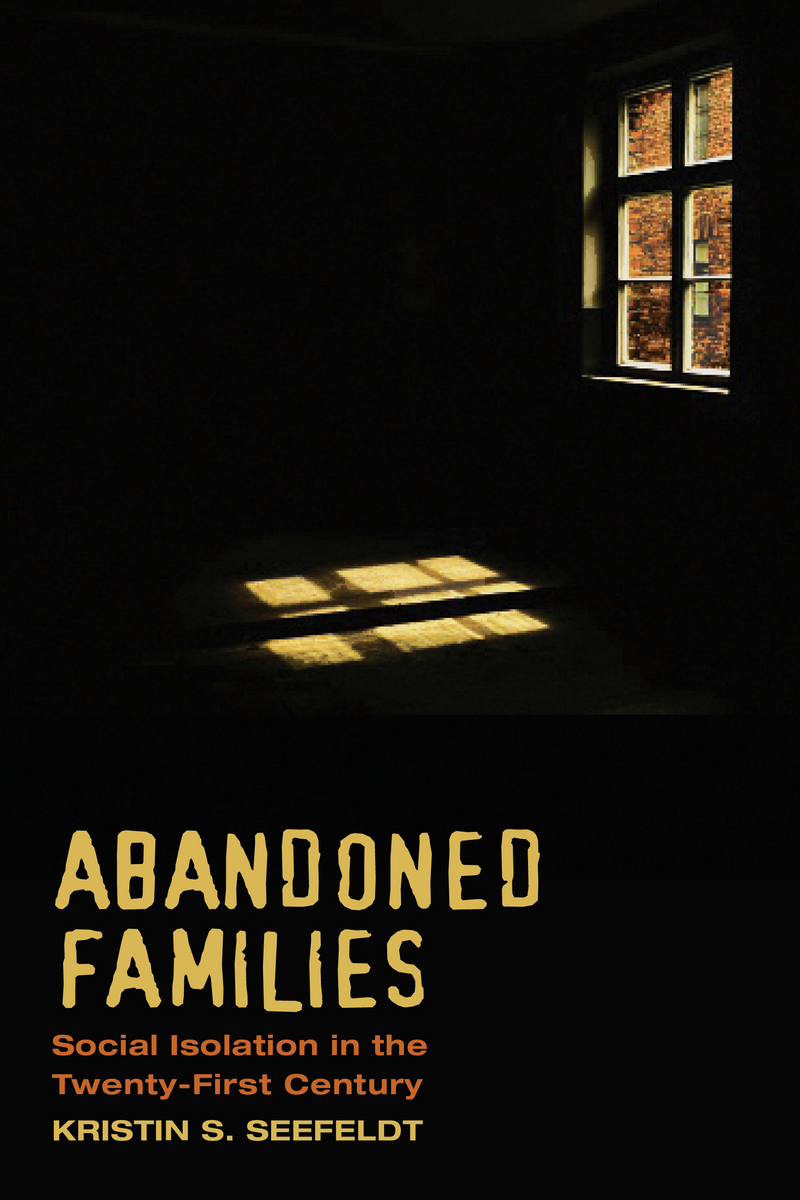Abandoned Families: Social Isolation in the Twenty-first Century Chapter Summary

Abandoned Families: Social Isolation in the 20-First Century
Russell Sage Foundation, 2016
Paper: 978-0-87154-783-5 | eISBN: 978-one-61044-862-eight
Library of Congress Nomenclature HQ536.S3989 2016
Dewey Decimal Classification 306.850973
Nearly THIS BOOK | Author BIOGRAPHY | REVIEWS | TOC
ABOUT THIS BOOK
Choosing whom to marry involves more emotion, as racial politics, cultural mores, and local demographics all shape romantic choices. InMarriage Vows and Racial Choices, sociologist Jessica Vasquez-Tokos explores the decisions of Latinos who marry either within or outside of their racial and ethnic groups. Drawing from in-depth interviews with near 50 couples, she examines their marital choices and how these unions influence their identities as Americans.
Vasquez-Tokos finds that their experiences in childhood, boyhood, and immature adulthood shape their perceptions of race, which in turn influence their romantic expectations. Most Latinos marry other Latinos, but those who intermarry tend to marry whites. She finds that some Latina women who had domineering fathers assumed that most Latino men shared this trait and gravitated toward white men who differed from their fathers. Other Latina respondents who married white men fused ideas of race and class and perceived whites as higher status and considered themselves to exist "marrying up." Latinos who married non-Latino minorities—African Americans, Asian Americans, and Native Americans—often sought out non-white partners because they shared similar experiences of racial marginalization. Latinos who married Latinos of a different national origin expressed a desire for shared cultural commonalities with their partners, merely—like those who married whites—oft associated their own national-origin groups with oppressive gender roles.
Vasquez-Tokos as well investigates how racial and cultural identities are maintained or altered for the respondents' children. Within Latino-white marriages, biculturalism—in dissimilarity with Latinos adopting a white "American" identity—is likely to sally. For case, white women who married Latino men often embraced aspects of Latino civilisation and passed it along to their children. Yet, for these children, upholding Latino cultural ties depended on their proximity to other Latinos, especially extended family members. Both location and family relationships shape how parents and children from interracial families understand themselves culturally.
As interracial marriages go more mutual,Matrimony Vows and Racial Choices shows how race, gender, and course influence our marital choices and personal lives.
Author BIOGRAPHY
KRISTIN S. SEEFELDT is assistant professor of social work at the University of Michigan.
REVIEWS
"This is a remarkable narrative of how institutions that traditionally promote social mobility and inclusion have abased striving families in Detroit, a city that has besides been forsaken. Based mainly on intensive interviews of low- and moderate-income mothers from 2006 to 2011, Kristin Due south. Seefeldt's riveting account of their struggles and her thoughtful policy suggestions to address their plight brand Abased Families a must-read for scholars, policymakers, and lay readers. I strongly recommend this book as one of the most powerful studies of urban inequality in the last half century."
—William Julius Wilson, Lewis P. and Linda Fifty. Geyser University Professor, Harvard University
"The study of poverty has avant-garde, like all good scientific discipline, through increasingly specialized studies of declining employment, growing segregation, sky-loftier incarceration, increasing debt, and much more. In Abandoned Families, Kristin Due south. Seefeldt reassembles the big picture of U.S. poverty, demonstrating that the poor take been abandoned past each and every establishment with which they engage. It'southward a tale of wholesale systemic failure that makes it clear that, when it comes to poverty policy, no one's minding the shop."
—David B. Grusky, Barbara Kimball Browning Professor and director, Stanford Center on Poverty and Inequality
Tabular array OF CONTENTS
Contents
List of Tables
Well-nigh the Author
Acknowledgments
Affiliate i. From Social Isolation to Social Abandonment
Chapter 2. Abased Detroit
Chapter 3. Abandoned past Institutions of Inclusion and Stability: The Failed Promise of Employment
Chapter four. Abandoned by Institutions of Mobility: The Failed Promise of Postsecondary Education and Homeownership
Affiliate five. Abandoned past the Condom Net: Contestations, Denials, and Incompetence in Benefit Processing
Affiliate 6. Debt: The New Sharecropping Organization
Chapter vii. Making Abased Families Striving Families Again
Methodological Appendix
Notes
References
Alphabetize
Nearby on shelf for The Family. Marriage. Women / The family. Marriage. Home:
9780674026322
9780674004849
mcwhirterwassiriour.blogspot.com
Source: https://www.bibliovault.org/BV.book.epl?ISBN=9780871547835
0 Response to "Abandoned Families: Social Isolation in the Twenty-first Century Chapter Summary"
Post a Comment